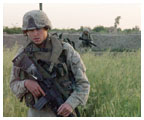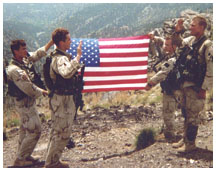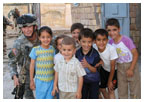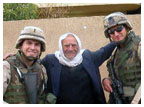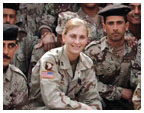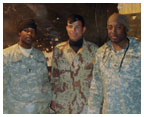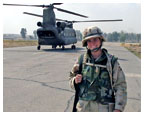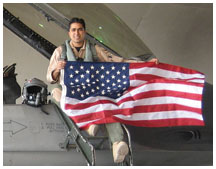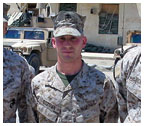
|
November 7, 2007: Features
Donovan Campbell ’01 (right)
Matt Scherrer ’01 (far right)
Pete Hegseth ’03
Tom Viscelli ’02 (left)
Jeanne Hull *07 (center, left)
Karim Branford ’04 (left)
Sarah Apgar ’02
Raj Shah ’00
Jeff Bozman ’05 Photographs courtesy of the alumni featured in article |
Lessons
from a war
For these alumni, Princeton was a prelude to a
deeper education
By E.B. Boyd ’89
ON THE WEB: Profiles of alumni who have served in Iraq and Afghanistan, click here.
Donovan Campbell ’01 remembers the day in Iraq he learned a lesson about leadership. He was a Marine lieutenant stationed in Ramadi, a mainly Sunni city west of Baghdad. It was May 2004, that bloody spring when open rebellion exploded in Anbar Province. Campbell’s platoon had spent the morning hunting for roadside bombs. The Marines scanned the city’s major thoroughfares, trying to spot anything that looked different, something that might indicate a newly planted bomb. It was a nerve-racking duty, one Campbell’s unit pulled every four days.
They had been hit that morning. A bomb had gone off, exploding into one of Campbell’s Humvees. One Marine had a concussion. Another couldn’t feel his arm. But that was getting off lightly. Now they were back at their base. It was midday; the blistering sun was high in the desert sky. Campbell was coming back from the base command center when he saw one of his Marines carrying two shovels and a pick. In the distance, his men were stripped down to their T-shirts and digging at the hard-packed earth. Beaten up though they were, they got no break. Sandbags had to be filled, and so fill sandbags they did. As an officer, Campbell could have taken refuge in some air-conditioned building. Instead, he stripped off his shirt, picked up a shovel, and began scratching at the earth alongside his men.
Later he would recall that it was at times like that this, when he had a choice to continue on to comfort but chose instead to blister his hands with the enlisted men, that he gained the dedication of the Marines who served with him. “In college, I thought leadership would be more about myself, would be more about creating a compelling vision, being a charismatic speaker, mobilizing people behind my ideas about what was correct and what we needed to do,” Campbell says. “Now I understand that more of leadership is service to your team and taking care of the welfare of others, and leading by consistent example and force of character rather than by force of intellect and charismatic speeches.”
Campbell is one of dozens of Princetonians who have served in the ongoing conflicts in Iraq and Afghanistan. Like others, he has realized that while Princeton gave him much he would use to succeed in life, the world outside the ivory tower has still more to teach. Some of those who have served speak about the self-confidence they developed from having enormous responsibility thrust upon them at a young age. Many describe how the experience deepened their commitment to the spirit expressed in Princeton’s informal motto: “In the nation’s service, and in the service of all nations.” One alumnus, who asked not to be identified because he is still serving, says that he had hoped serving in a combat unit would provide the kinds of insights “into life and death” that one can’t learn in a classroom. That hasn’t happened, he says; “there has been no revelation.” But he did learn about the strength of the human spirit: “Few Americans appreciate the level of violence [the Iraqi people] experience on a daily basis, and I respect that Iraqis have endured so much without simply cracking up.”
For alumni — even those who had aced Princeton exams and breezed through labs — service has meant a new and challenging way of thinking about problems. Matt Scherrer ’01 served four tours as a lieutenant in one of the Army’s elite Ranger infantry units, hunting for Taliban and al-Qaida fighters in Afghanistan and insurgents in Iraq. Scherrer says he had to ditch the hyperanalytical approach to problem-solving he’d learned at Princeton and focus instead on calling the shots quickly, with incomplete information. “I would want to sit there and overthink every possibility,” he says. “Sometimes there wasn’t the time to do that like you would on an exam or a senior thesis. ... A way to do the mission needed to be decided here and now, and fortunately, my sergeants would say, ‘Hey sir, let’s not over-think this. We have to go out and do it.’”
Pete Hegseth ’03, who studied politics as an undergraduate, was plucked out of his infantry unit and assigned to work on reconstruction projects with local leaders in the predominantly Sunni city of Samarra. It was the spring of 2005. The United States was trying to build up the local leadership and get Iraqis to take on more responsibility for rebuilding their country. But the Iraqis were wary: In the midst of an insurgency, cooperating with the Americans was dangerous. Hegseth understood that before the local leaders would tackle questions of infrastructure and education, the Americans had to build credibility and provide weapons, armor, and other forms of security. They did, and gradually, the Iraqis’ trust grew. “I learned a lot of theory at Princeton,” Hegseth says, “but none of it matters if you cannot provide security. Guns and violence have the potential to override any theory, no matter how sound.” The experience taught Hegseth an important lesson about the value of personal relationships and support: After his unit was rotated out and replaced by another one, the Americans’ relationships with the Iraqis fell apart, and plans could not be sustained, he says.
The challenges Tom Viscelli ’02 faced left him with a liberating sense of self-confidence. By his own admission, he was not the most conscientious student at Princeton. And he chafed against the rigidity of ROTC; he considered quitting, but remained because he needed the scholarship. In the Army, Viscelli trained in “fire support,” the advanced reconnaissance teams that travel ahead of the infantry, scoping out the battlefield, identifying enemy locations, and advising artillery crews where to lob their shells. But by the time Viscelli arrived in Baghdad in the summer of 2003, major ground combat was over. Instead, there was a need for people who could scout civilian communities, develop an understanding of the local culture, and advise the military on where it should invest its money.
Viscelli was assigned to lead Army teams that worked with neighborhood councils in Baghdad to identify projects to help rebuild the country. It was an awesome responsibility for a 23-year-old lieutenant with no experience in civic leadership, construction, or budgets. “These were well-established adults,” Viscelli says of the Iraqi council leaders. “They didn’t want to listen to some punk kid coming in and telling them what they should do.” Like Hegseth, he quickly learned that the key to building credibility was to show results. By the end of his deployment a year later, Viscelli’s teams had rebuilt 27 schools, three parks, and a handful of government buildings and hospitals. “The thing that surprises me is that I accomplished anything at all,” he says. “A senior thesis is one thing, where all you have to do is sit, read, write, and depend on yourself. Rebuilding a school or a hospital is a much more complex undertaking, with just as much individual work but a lot more running and trusting a team. ... I didn’t learn to work until I got into the Army. It speaks to how working with a good team can really leverage your abilities.”
A newfound appreciation for teamwork is a common theme, offered by many of the alumni. That’s true even for career soldiers like Jeanne Hull *07, who graduated from West Point in 2000 and has served two tours in Iraq. Humility has a role, too, she realized. At West Point, Hull studied the finer points of leadership and military doctrine. She learned that the United States has the most capable military in the world, a point of pride among active-duty troops. But that mind-set sometimes proved a liability once the U.S. military turned its focus to rebuilding Iraq, says Hull, who serves in military intelligence. Troops particularly struggled with setting up new security forces. One day an Iraqi minister announced that he independently had set up an elite police force. The Americans were taken by surprise: They had confidence in their own methods, and initially were wary of how the new group would work.
The new unit, however, performed so well that eventually it was used to fight some of the toughest insurgencies. Hull, who received an MPA degree and is now pursuing a doctorate in the Woodrow Wilson School, credits the success with the caliber of recruits attracted by the minister’s approach. Calling it a “special” unit gave it a certain prestige in Iraqi eyes. And because it had been created by an Iraqi, the men who joined could avoid being tagged as “American stooges,” she says. “There’s a certain amount of cultural arrogance from our side when we go and deal with other countries,” Hull says. “One of the things we really had to learn ... was how to do things the Iraqi way — that sometimes, American methods and American ways of doing things would not function in a society like theirs, and that the Iraqis really had some very good ideas and some good initiatives.”
Though Princeton teaches students to appreciate complexity, fighting a war drums it in. Several alumni say that what they have seen in Iraq rarely is as clear-cut as what gets reported by the media, particularly when it comes to the religious divides that some commentators say are at the center of an emerging civil war. “The dynamic over there is so complex,” says Pat Donohue ’03, who patrolled Baghdad as a tank platoon commander in 2004 and 2005 and is now in Iraq on his second deployment. “You would have Sunnis who would talk to you and would want help, and you would have Sunnis that were ex-Baathists who wanted absolutely nothing to do with you. On the other hand, you had Shi’as who would accept the help in certain areas, and you had the Shi’as who were more closely aligned with ... [anti-American cleric Moqtada al-]Sadr, that wanted absolutely nothing to do with you.” Karim Branford ’04, who was scheduled to leave Iraq next month after a year as an infantry platoon leader, says his experience with the media has left him
skeptical about their commitment to providing a complete picture of developments on the ground. “I’ve had CNN, FOX, BBC, and [the Associated Press] go on patrols with me,” Branford writes in an e-mail from Iraq, “and they
never want to see the government at work, the utilities we helped restore, the marketplaces that used to be deserted.
It’s always, ‘What missions are you doing (raids, cordon and searches, etc.)?’ ”
Some of the most important lessons
learned during military service, alumni say, have come from the troops serving with them — often, people who have not had the kinds of opportunities associated with a Princeton education. Crossing that social divide isn’t always easy. Lt. Sarah Apgar ’02, who served in Mosul in 2003, learned that the Princeton moniker so valued in the civilian world can be a liability in the military one, where the Ivy League’s elitist reputation can make it difficult to form connections with colleagues. “It was a huge hump to get over,” Apgar says, even more than her gender was with the all-male Army engineering platoon she led.
Yet alumni say that when they bridged the gap, the results brought great rewards. Raj Shah ’00 was called out of the New Jersey Air National Guard reserves to fly F-16s in Iraq in 2006. On his days off, Shah volunteered at the base hospital. He carried stretchers from arriving helicopters into the operating room and put injured soldiers on planes headed to military hospitals in Germany. He often visited recovering troops on the wards, shooting the breeze and sharing the contents of care packages. He was impressed by the men he met. “The average Marine had two questions he asked the doctor when he first came in. He may have had a serious injury from an IED, but his questions were, one: ‘Doctor, I’m OK. Make sure my buddy down the hall is OK because he’s doing worse.’ And two: ‘When can I return to my unit?’ It was very humbling to see what motivated the average guy on the line and how much he believed in doing his task to the best of his ability, regardless of the political discussion and the debates happening back home,” Shah recalls. The experience, he says, added a human dimension to the theoretical debates he so relished at the Woodrow Wilson School.
Jon Shine ’98, who joined ROTC and then the Army for the leadership experience he thought would prove useful in the private sector, has found personal satisfaction in working with the young enlisted soldiers under his command —
so much so that he remained in uniform after his initial contract was up. On his second tour in Iraq, Shine led 130 soldiers who managed an interrogation center near Baghdad. Shine taught his men to use the “CNN test” — to eschew any behavior that would shame them if broadcast on the international news. In part, he wanted to ensure that his team followed the rules, which were more heavily monitored in the wake of the Abu Ghraib prisoner-abuse scandal. But he also worried about the soldiers themselves. “I didn’t want them to come home and have nightmares about things that they did,” he says.
A long deployment for Shine’s unit put his soldiers’ young marriages to the test; back in the United States, re-enlistment bonuses fueled spending sprees. Shine found himself coaching his soldiers as much on personal issues as he did on job-related ones. The interactions gave him insight into the lives and struggles of people who don’t have the opportunities and benefits that a Princeton education affords. “That’s a more real representation of what our society is and what real people are like,” he says. “It’s good for us to have those interactions and not become arrogant or unrealistic about the challenges and issues that real people struggle with.”
Jeff Bozman ’05 is a lieutenant in the Marines who served a three-month tour in Ramadi last year. During his sophomore year, Bozman interned on Capitol Hill with Maryland Sen. Paul Sarbanes ’54. He recalls watching congressional debates about whether to go to war against Iraq, and particularly remembers an impassioned speech by West Virginia Sen. Robert Byrd, urging forbearance and warning about the costs of such an undertaking — a speech made, Bozman noticed, to an empty Senate chamber. At the time, the issue was still abstract to Bozman, who would not put on a uniform for almost three years. In Ramadi, Bozman’s duties as an adjutant — human-resource functions like payroll, awards, and discipline — mostly kept him within the comparatively safe confines of his base. But drafting medal recommendations, including posthumous Bronze Star medals for bravery awarded to two young Marines who lost their lives in attempts to save others, gave Bozman a visceral understanding of who ultimately is paying the price in the ongoing conflict. “The real heroes are the 18- and 19-year-olds who put everything on the line, trusting that their leaders will make the right decisions,” Bozman says.
That realization was driven home one day when he had to head into town in an armored convoy. The team he was riding with had made this kind of drive scores of times already. When they arrived at their destination without incident, Bozman turned to the vehicle commander and said, “Thanks for a safe ride. I owe you a beer.”
“You’re welcome, sir,” Bozman remembers the man replying.
“But I’ll have to wait about two years for that beer.”
The corporal, who commanded a team of Marines and faced the daily possibility
of getting hit by a roadside bomb, machine-gun fire, or a rocket-propelled
grenade, was only 19. ![]()
E.B. Boyd ’89 is a freelance writer in San Francisco.
ON THE WEB: Profiles of alumni who have served in Iraq and Afghanistan, click here.

